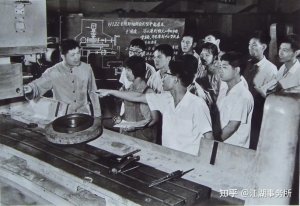Presented By: Lieberthal-Rogel Center for Chinese Studies
LRCCS Noon Lecture Series | The Rise and Fall of Factory-Based Schools in China
Joel Andreas, Department of Sociology, Johns Hopkins University

After the 1949 Revolution, China built a massive adult education system based in factories and villages, which at times enrolled more students than the conventional education system. This talk examines the evolution of the factory-based school system as it developed alongside the conventional system. Like adult schools in other countries, factory-based schools in China provided workers with remedial education and technical training, but they were also part of an ideologically-driven effort to diminish class differences based on education and reduce the gap between those who labored with their minds and those who labored with their hands. Mao Zedong emphasized this second set of goals as he pushed for the rapid expansion of factory-based schools during the Great Leap Forward and the Cultural Revolution decade. Although Chinese factories continued to operate workers schools into the post-Mao era, industrial restructuring and the marketization of both employment and education have led to their decline, and relatively few have survived. This talk considers the causes and consequences of the expansion and decline of factory-based schools, based on an analysis of official publications and interviews with factory leaders and workers, including many who participated in these schools.
Joel Andreas, a member of the Sociology Department at Johns Hopkins University, studies political contention and social inequality in China. His first book, "Rise of the Red Engineers: The Cultural Revolution and the Origins of China’s New Class," analyzes the contentious merger of old and new elites following the 1949 Revolution. His second book, "Disenfranchised: The Rise and Fall of Industrial Citizenship in China," traces radical changes that have fundamentally transformed industrial relations over the past seven decades. He has also published several comic books, including "Addicted to War: Why the US Can’t Kick Militarism."
Attend in person or via Zoom. Zoom registration at https://umich.zoom.us/webinar/register/WN_4szKQkX2SvGzGHQrt_FO-g
If there is anything we can do to make this event accessible to you, please contact us. Please be aware that advance notice is necessary as some accommodations may require more time for the university to arrange.
Joel Andreas, a member of the Sociology Department at Johns Hopkins University, studies political contention and social inequality in China. His first book, "Rise of the Red Engineers: The Cultural Revolution and the Origins of China’s New Class," analyzes the contentious merger of old and new elites following the 1949 Revolution. His second book, "Disenfranchised: The Rise and Fall of Industrial Citizenship in China," traces radical changes that have fundamentally transformed industrial relations over the past seven decades. He has also published several comic books, including "Addicted to War: Why the US Can’t Kick Militarism."
Attend in person or via Zoom. Zoom registration at https://umich.zoom.us/webinar/register/WN_4szKQkX2SvGzGHQrt_FO-g
If there is anything we can do to make this event accessible to you, please contact us. Please be aware that advance notice is necessary as some accommodations may require more time for the university to arrange.